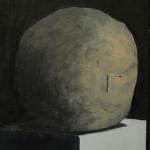
The Caretaker An Empty Bliss Beyond This World
(History Always Favours The Winners)
At some point, music of the past becomes anyone's archive to rediscover, reposition, and assemble into a record, as James Kirby, aka The Caretaker, has done on An Empty Bliss Beyond This World. One can easily see how this idea is problematic. Copyrights have existed since the Renaissance; behind every piece of music there is a composer, a record company, and an entitlement of ownership. Listening to An Empty Bliss, I have the feeling that there’s some plundering going on, or (to use a lethal word) some plagiarism. I keep asking myself: who’s the musician here? And moreover, I ask: what happens when we are forced to listen to music that's been re-titled – a reproduction of something we didn’t know was ever even produced in the first place?
Kirby, in an interview with Headphone Commute, revealed that he used old ballroom records he bought in New York as source material for An Empty Bliss. But what does “source material” actually entail? One can imagine him going back to England with the records in hand, recording them with a turntable in a few days, and sending it to History Always Favours The Winners, the label it is released on. While that may be the general process that actually happened, it's easy to dismiss An Empty Bliss as just that. Yet this picture doesn’t encompass everything Kirby is doing with this record. He's not just aware of the outdated-ness of his source material, he's also aware that its harmonic overtones can be manipulated to induce a whole other matrix of emotional permutations. Even with today's technology, harvesting emotions as such is perplexing and strenuous. But Kirby does it with a special kind of grace.
Our emotions are constantly ushered into a haunted ballroom of the past. The music is textured under vinyl scratches and loads of echo, giving an eerie feeling: music ghosts could waltz to. Some pieces are looped, some are complete musical compositions, others are cut-off right before they reach climax. Kirby even repeats tracks, “to give a sense of deja vu and to leave people a little lost and confused,” he explains. Moods are important, not just to glimpse then as sonic gradations, but to escape in them, and sometimes, run away from them. Kirby not only suggests this, he emphasizes it. Because of that, the act of remembering and its relationship to our mood (and how that relationship is complicated) becomes a central theme of the music. (Kirby claimed that the song titles “come from books about people suffering from Alzheimer's and/or other brain related malfunctions that alter reality.”) And like remembering anything, there are distortions, lacunas, and exaggerations that, soon overtime, become embellished false parts in our memory, in the false reality of our past.
Listening to An Empty Bliss Beyond This World, there’s a mysterious sense that what we're listening to is pure fantasy, designed to perplex our constant perception of our reality, of the moment, now, as we experience it, right now. This may just be the first record that emits such a strange feeling with such sublime ghostliness.
31 October, 2011 - 10:00 — Michael Iovino